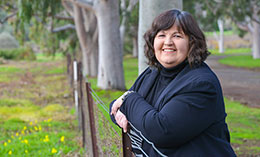18 July 2016
 Gender equality may have come a long way, but new research from the University of South Australia is delving into the impact of the disparity between sons and daughters in relation to farming family inheritances.
Gender equality may have come a long way, but new research from the University of South Australia is delving into the impact of the disparity between sons and daughters in relation to farming family inheritances.
While research showing that farms and other primary producer properties are usually inherited by sons, with daughters mostly excluded from consideration, is not unique UniSA PhD student Leonnie Blumson is throwing up new perspectives by investigating how these decisions play out.
“I’m hoping to provide a deeper, contextualised understanding of farming family inheritances that will advance our currently 'thin' knowledge on this topic,” Blumson says.
“Previous research has not fully considered the contributions that successor sons make to the farm and to their parents, nor the inheritance provided to off-farm children in the form of other assets.
“I am also providing opportunities for farmers' daughters to add their perspectives and experiences because this is certainly lacking from current knowledge.”
Through two separate studies, Blumson is gathering firsthand accounts from farmers’ daughters about their own personal experiences.
The first study involved interviews with daughters of fruit ‘blockies’ in South Australia’s Riverland and broadacre farms in the State’s Yorke Peninsula but it has been challenging encouraging participants to discuss their experiences.
“In trying to find women to interview, I found that some women who were unhappy with what had happened in their family didn’t want to talk about it – some find it too distressing or simply don’t want to think too much about the financial implications of the inheritance,” Blumson says.
Blumson is now seeking participants for stage two, which uses an anonymous online forum with privacy protection and is open to daughters of all types of primary producers across Australia.
“I’m hopeful that this forum will be more encouraging for farmer’s daughters, especially once they see what other women are saying which may help them articulate their own experiences,” she says.
Director of UniSA’s Centre for Social Change and Blumson’s supervisor, Associate Professor Lia Bryant, says Australian women have a long history as farmers, in contributing to family farming, in growing rural communities and in agripolitics.
“Women rarely inherit farming properties, which diminishes opportunities for them to farm in their own right,” Prof Bryant says.
“Leonnie's research will provide insight from the perspective of women on how cultural norms associated with inheritance have shaped their pathways and choices about continuing in the agricultural sector and for their overall economic wellbeing.”
During her literature review, Blumson found farm succession tended to be business focused and ‘gender blind’, not distinguishing between genders but rather using the term ‘successor children’.
“The general story shows that farmers typically only encourage an interest in farming among their sons,” Blumson says.
“I was able to collect some data showing how often the successor of a farm is a daughter and have gained a reasonable cross section of this in western countries.
"In Australia, it is estimated that just 10 per cent of farm successors are daughters – which may be a bit above average overall.
“And some 20 to 30 per cent of families only have daughters, so there is certainly a gap, and indications are that parents will more often sell the farm if they only have daughters.
“One issue that I’ve picked up on is that in some families where there are no sons, if a daughter marries someone with an interest in farming, then this daughter is more likely to inherit the property.”
Considering land values, inheriting a farm can be a very significant legacy but Blumson says most of the women she has interviewed didn’t know the exact economic value of their family farm – in the case of broad acre farms, they simply said it was obviously in the millions of dollars.
"One young woman who was reluctant to participate in an interview, suggested she did not want to think about the value of the farm as she was worried this would make her upset,” Blumson says.
“Gender bias is not unique to farming families but also common across industries when it comes to family business succession.
“For example, just last year when Rupert Murdoch announced that his two sons would take over when he stepped down as chief executive of 21st Century Fox, none of his daughters were mentioned.
“In broader society, families normally treat children the same in regard to inheritance, but it appears that it’s only in business families where there has been a gender disparity.”
If her research reveals that systemic gender inequality is occurring, then Blumson hopes the results can increase public awareness of this social issue and help promote the advancement of women's rights.
Blumson was motivated to pursue this topic after developing an interest in gender issues during her Bachelor of Psychology and also from her own personal experience in her farming family.
For anyone interested in participating, further information and instructions can be found at http://unisa.edu.au/farming-families-study.
Contact details: UniSA PhD student Leonnie Blumson, office 08 8285 8388 mob 0403022178 email leonnie.blumson@mymail.unisa.edu.au
Media contact: Katrina McLachlan office +08 83020961 mob 0419815443 email katrina.mclachlan@unisa.edu.au


